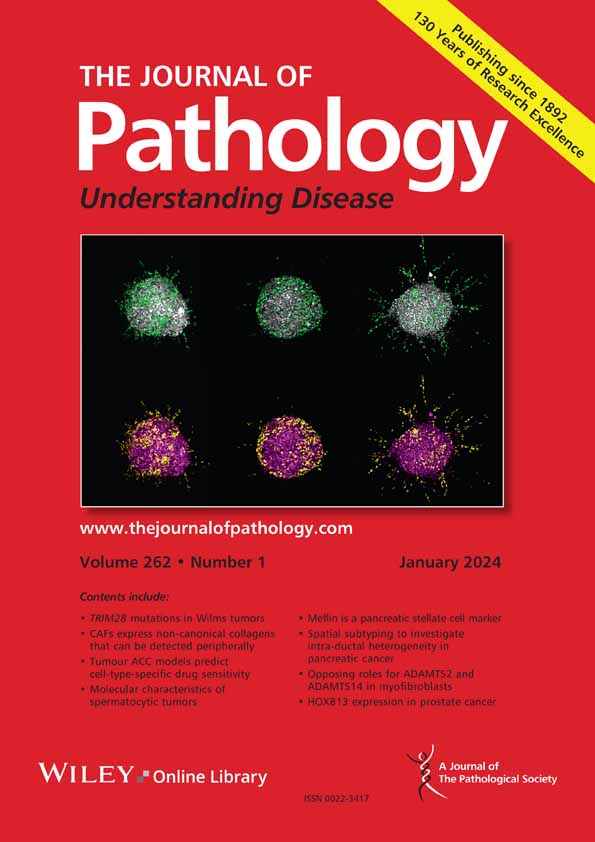Laura Libera, Alessandro Vanoli, Nora Sahnane, Muhammad Adnan, Camilla Guerini, Giovanni Arpa, Paola Ilaria Bianchi, Marco Vincenzo Lenti, Gino Roberto Corazza, Stefano La Rosa, Antonio Di Sabatino, Daniela Furlan
下载PDF
{"title":"LINE-1 hypomethylation characterizes the inflammatory response in coeliac disease associated-intestinal mucosa and small bowel adenocarcinomas","authors":"Laura Libera, Alessandro Vanoli, Nora Sahnane, Muhammad Adnan, Camilla Guerini, Giovanni Arpa, Paola Ilaria Bianchi, Marco Vincenzo Lenti, Gino Roberto Corazza, Stefano La Rosa, Antonio Di Sabatino, Daniela Furlan","doi":"10.1002/path.6371","DOIUrl":null,"url":null,"abstract":"<p>Long interspersed nuclear elements 1 (LINE-1) are the most abundant and the only autonomous mobile elements in the human genome. When their epigenetic repression is removed, it can lead to disease, such as autoimmune diseases and cancer. Coeliac disease (CeD) is an immune-mediated disease triggered by an abnormal T-cell response to dietary gluten and a predisposing condition of small bowel adenocarcinoma (SBA), frequently characterized by epigenetic alterations. The aim of this work was to assess LINE-1 methylation by bisulphite pyrosequencing and NanoString® gene transcription analysis in 38 CeD-SBAs compared with 25 SBAs associated with Crohn's disease (CrD-SBAs) and 25 sporadic SBAs (S-SBA). Both analyses were also performed in duodenal mucosae from 12 untreated CeD patients (UCD) and 19 treated CeD patients (TCD), and in 11 samples of normal intestinal mucosa to better investigate the role of LINE-1 deregulation in CeD and in CeD-SBA. A significant loss of LINE-1 methylation was observed in CeD-SBAs and in mucosae from UCD patients (with very similar methylation levels) compared with controls. By contrast, a restoration of normal LINE-1 methylation levels was found in TCD mucosae after a strict gluten-free diet. LINE-1 hypomethylation does not lead to expression of ORF1 and ORF2, with the only exception being for one CeD-SBA. The expression analysis of enzymes modulating DNA methylation and inflammatory genes confirmed that CeD-SBA shared a very similar expression profile of UCD mucosae showing a strong upregulation of genes involved in inflammation, immune response, and T-cell activity compared with TCD mucosae. For the first time, this work demonstrates that loss of DNA methylation is an intrinsic epigenetic feature of CeD, accompanying the immune response as a reversible mechanism in patients following a strict gluten-free diet, and suggests the possible role of LINE-1 hypomethylation in promoting cell adaptability during the gliadin-related inflammatory process. © 2024 The Author(s). <i>The Journal of Pathology</i> published by John Wiley & Sons Ltd on behalf of The Pathological Society of Great Britain and Ireland.</p>","PeriodicalId":232,"journal":{"name":"The Journal of Pathology","volume":"265 1","pages":"99-109"},"PeriodicalIF":5.6000,"publicationDate":"2024-11-27","publicationTypes":"Journal Article","fieldsOfStudy":null,"isOpenAccess":false,"openAccessPdf":"https://www.ncbi.nlm.nih.gov/pmc/articles/PMC11638666/pdf/","citationCount":"0","resultStr":null,"platform":"Semanticscholar","paperid":null,"PeriodicalName":"The Journal of Pathology","FirstCategoryId":"3","ListUrlMain":"https://onlinelibrary.wiley.com/doi/10.1002/path.6371","RegionNum":2,"RegionCategory":"医学","ArticlePicture":[],"TitleCN":null,"AbstractTextCN":null,"PMCID":null,"EPubDate":"","PubModel":"","JCR":"Q1","JCRName":"ONCOLOGY","Score":null,"Total":0}
引用次数: 0
引用
批量引用
Abstract
Long interspersed nuclear elements 1 (LINE-1) are the most abundant and the only autonomous mobile elements in the human genome. When their epigenetic repression is removed, it can lead to disease, such as autoimmune diseases and cancer. Coeliac disease (CeD) is an immune-mediated disease triggered by an abnormal T-cell response to dietary gluten and a predisposing condition of small bowel adenocarcinoma (SBA), frequently characterized by epigenetic alterations. The aim of this work was to assess LINE-1 methylation by bisulphite pyrosequencing and NanoString® gene transcription analysis in 38 CeD-SBAs compared with 25 SBAs associated with Crohn's disease (CrD-SBAs) and 25 sporadic SBAs (S-SBA). Both analyses were also performed in duodenal mucosae from 12 untreated CeD patients (UCD) and 19 treated CeD patients (TCD), and in 11 samples of normal intestinal mucosa to better investigate the role of LINE-1 deregulation in CeD and in CeD-SBA. A significant loss of LINE-1 methylation was observed in CeD-SBAs and in mucosae from UCD patients (with very similar methylation levels) compared with controls. By contrast, a restoration of normal LINE-1 methylation levels was found in TCD mucosae after a strict gluten-free diet. LINE-1 hypomethylation does not lead to expression of ORF1 and ORF2, with the only exception being for one CeD-SBA. The expression analysis of enzymes modulating DNA methylation and inflammatory genes confirmed that CeD-SBA shared a very similar expression profile of UCD mucosae showing a strong upregulation of genes involved in inflammation, immune response, and T-cell activity compared with TCD mucosae. For the first time, this work demonstrates that loss of DNA methylation is an intrinsic epigenetic feature of CeD, accompanying the immune response as a reversible mechanism in patients following a strict gluten-free diet, and suggests the possible role of LINE-1 hypomethylation in promoting cell adaptability during the gliadin-related inflammatory process. © 2024 The Author(s). The Journal of Pathology published by John Wiley & Sons Ltd on behalf of The Pathological Society of Great Britain and Ireland.
LINE-1低甲基化是腹腔疾病相关肠粘膜和小肠腺癌炎症反应的特征。
长穿插核元素1(LINE-1)是人类基因组中最丰富也是唯一的自主移动元素。当它们的表观遗传抑制被消除时,就会导致疾病,如自身免疫性疾病和癌症。乳糜泻(Celiac disease,CeD)是一种由 T 细胞对饮食中麸质的异常反应引发的免疫介导疾病,也是小肠腺癌(SBA)的易感性疾病,常以表观遗传学改变为特征。这项工作的目的是通过亚硫酸氢盐热测序和 NanoString® 基因转录分析,评估 38 例 CeD-SBA 与 25 例克罗恩病相关 SBA(CrD-SBA)和 25 例散发性 SBA(S-SBA)的 LINE-1 甲基化情况。为了更好地研究LINE-1失调在CeD和CeD-SBA中的作用,还对12名未经治疗的CeD患者(UCD)和19名经治疗的CeD患者(TCD)的十二指肠粘膜以及11份正常肠粘膜样本进行了这两项分析。与对照组相比,在 CeD-SBA 和 UCD 患者的粘膜(甲基化水平非常相似)中观察到 LINE-1 甲基化的明显缺失。相比之下,在严格无麸质饮食后,TCD 粘膜中的 LINE-1 甲基化水平恢复正常。LINE-1 低甲基化不会导致 ORF1 和 ORF2 的表达,唯一例外的是一种 CeD-SBA。对调节DNA甲基化的酶和炎症基因的表达分析证实,CeD-SBA与UCD粘膜的表达谱非常相似,与TCD粘膜相比,涉及炎症、免疫反应和T细胞活性的基因有很强的上调。这项研究首次证明,DNA甲基化缺失是CeD的固有表观遗传学特征,它伴随着严格无麸质饮食患者的免疫反应,是一种可逆机制,并提示了LINE-1低甲基化在麸质相关炎症过程中促进细胞适应性的可能作用。© 2024 作者。病理学杂志》由约翰威利父子有限公司代表大不列颠及爱尔兰病理学会出版。
本文章由计算机程序翻译,如有差异,请以英文原文为准。



 求助内容:
求助内容: 应助结果提醒方式:
应助结果提醒方式:


